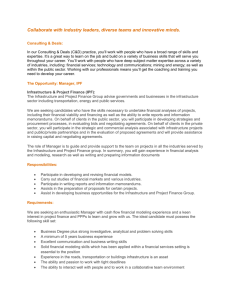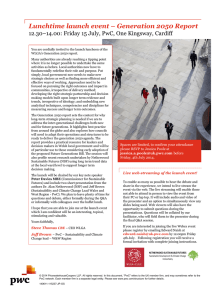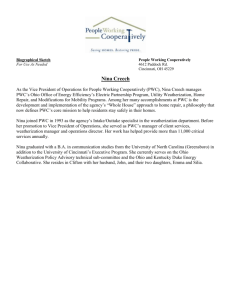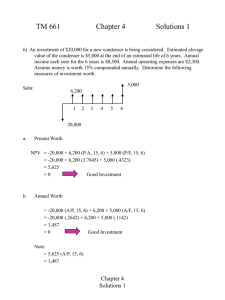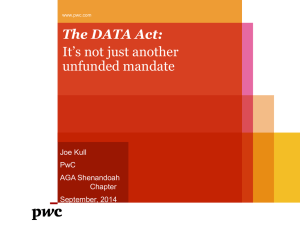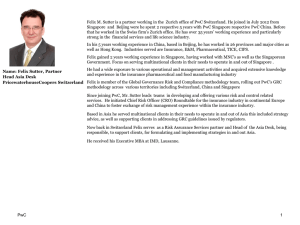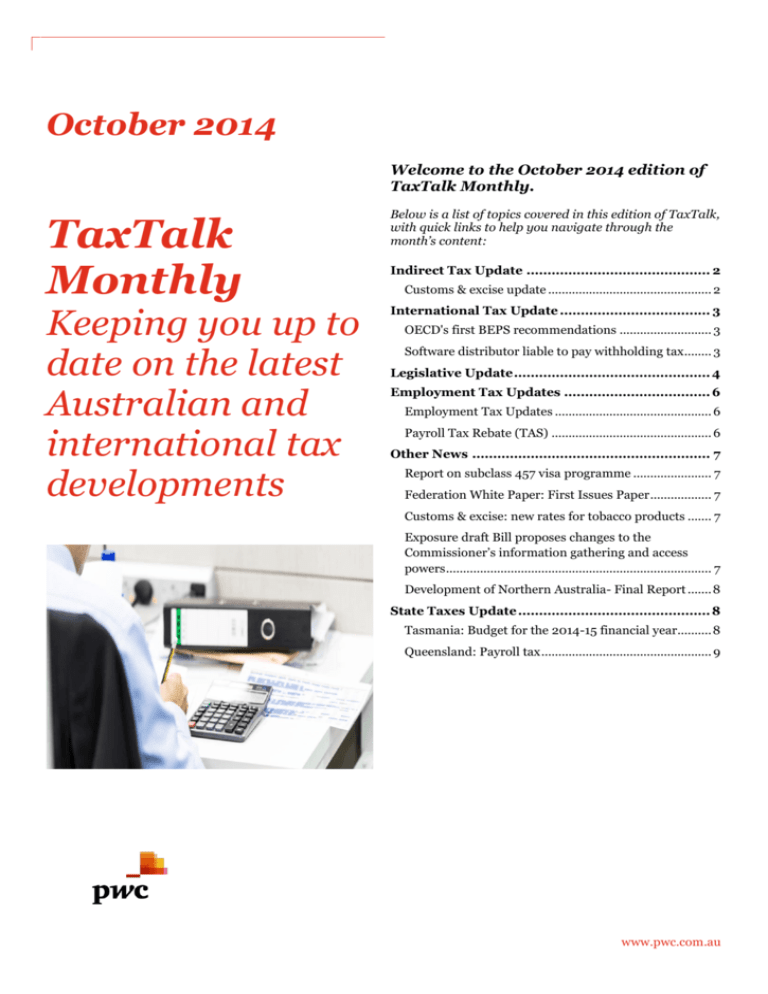
October 2014
Welcome to the October 2014 edition of
TaxTalk Monthly.
TaxTalk
Monthly
Below is a list of topics covered in this edition of TaxTalk,
with quick links to help you navigate through the
month’s content:
Keeping you up to
date on the latest
Australian and
international tax
developments
International Tax Update .................................... 3
Indirect Tax Update ............................................ 2
Customs & excise update ................................................ 2
OECD's first BEPS recommendations ........................... 3
Software distributor liable to pay withholding tax........ 3
Legislative Update ............................................... 4
Employment Tax Updates ................................... 6
Employment Tax Updates .............................................. 6
Payroll Tax Rebate (TAS) ............................................... 6
Other News ......................................................... 7
Report on subclass 457 visa programme ....................... 7
Federation White Paper: First Issues Paper .................. 7
Customs & excise: new rates for tobacco products ....... 7
Exposure draft Bill proposes changes to the
Commissioner’s information gathering and access
powers .............................................................................. 7
Development of Northern Australia- Final Report ....... 8
State Taxes Update .............................................. 8
Tasmania: Budget for the 2014-15 financial year.......... 8
Queensland: Payroll tax .................................................. 9
www.pwc.com.au
Indirect Tax Update
Customs & excise update
Korea-Australia Free Trade Agreement
Implementation
The Customs Amendment (Korea-Australia Free
Trade Agreement Implementation) Bill 2014
proposes to amend the Customs Act 1901 to
introduce new rules of origin for goods that are
imported into Australia from Korea, to implement
the Korea-Australia Free Trade Agreement. The
amendments will enable goods that satisfy the
rules of origin to enter Australia at preferential
rates of customs duty. Complementary
amendments to give effect to the Agreement will
also be made to the Customs Tariff Act 1995 by
Customs Tariff Amendment (Korea-Australia Free
Trade Agreement Implementation) Bill 2014. The
amendments will be operative from the later of 1
December 2014 or the day on which the Agreement
comes into force for Australia.
Goods which principally functioned as
electrical transformers were not entitled to
a tariff concession
In Becker Vale Pty Ltd and Chief Executive Officer
of Customs, the Administrative Appeals Tribunal
(AAT) held that certain goods which had the
principal function of transforming electricity, were
properly classified under heading 8504.34.00 in
Schedule 3 of the Customs Tariff Act 1995.
Accordingly, the applicant could not benefit from
TCO 0918490, as the tariff concession order did
not apply to goods classified under that heading.
Review of border fees, charges and taxes
The Minister for Immigration and Border
Protection has announced a review of border fees,
charges and taxes and the release of an Industry
Consultation Paper. The review will cover current
major charging arrangements at the border,
including Import Processing and
Passenger Movement Charges, certain import
related fees and charges recovered by the
Department of Agriculture, and visa application
charges. However, a number of other fees, charges
and taxes will not form part of the review, such as
customs duty (including refunds, tariff concessions
and drawbacks), GST and other indirect taxes that
Customs and Border Protection collects.
New rates of excise and customs duty for
tobacco products
Substituted rates of excise and customs duty were
released in respect of certain tobacco products
with effect from 1 September 2014. Following
recent legislative changes, excise and excise
equivalent customs duty on tobacco and tobacco
products are indexed based on average weekly
ordinary time earnings instead of the Consumer
Price Index, with indexation of rates scheduled to
occur on 1 March and 1 September.
Let’s talk
For a deeper discussion of how these issues might affect your business, please contact:
Peter Konidaris, National
Indirect Taxes leader
+61 (3) 8603 1168
peter.konidaris@au.pwc.com
Adrian Abbott, Sydney
+61 (2) 8266 5140
adrian.abbott@au.pwc.com
Gary Dutton, Brisbane
+61 (7) 3257 8783
gary.dutton@au.pwc.com
Suzi Russell, Sydney
+61 (2) 8266 1057
suzi.russell@au.pwc.com
Ross Thorpe, Perth & Melbourne
+61 (8) 9238 3117
ross.thorpe@au.pwc.com
Michelle Tremain, Perth
+61 (8) 9238 3403
michelle.tremain@au.pwc.com
PwC
Page 2
International Tax Update
OECD's first BEPS recommendations
The Organisation for Economic Co-operation and
Development (OECD) has released its first
recommendations for a co-ordinated international
approach to combat tax avoidance by
multinational enterprises, under the OECD/G20
Base Erosion and Profit Shifting (BEPS) Project.
The recommendations address the following seven
action points (BEPS reports) in the OECD BEPS
Action Plan:
Addressing the tax challenges of the digital tax
economy
Neutralising the effects of hybrid mismatch
arrangements
Preventing the granting of treaty benefits in
inappropriate circumstances
Countering harmful tax practices more
effectively
Guidance on transfer pricing aspects of
intangibles
Guidance on transfer pricing documentation,
and
Country-by-country reporting.
An Explanatory Statement provides an overview of
the seven BEPS reports and also describes the
status of the reports in the context of the overall
Project, including remaining technical issues and
potential interaction with the remaining Project
work to be carried out. It also outlines the next
steps for the BEPS Project work. Participating
countries have agreed on the feasibility of a
multilateral instrument to streamline
implementation of anti-BEPS measures and in
January next year, will consider a draft mandate
for an international conference so that a
multilateral instrument could be negotiated. For
further information see the PwC Tax Policy
Bulletin.
Software distributor liable to pay
withholding tax
In Task Technology Pty Ltd v Commissioner of
Taxation [2014] FCAFC 113, the Full Federal Court
dismissed the appeal by Task Technology Pty Ltd
(Task) against the decision at first instance (see
Task Technology Pty Ltd v Commissioner of
Taxation [2014] FCA 38), where Justice Davies
held that the payments made by Task to a
Canadian resident company (CaseWare) were
PwC
‘royalties’ for the purposes of the Convention
between Australia and Canada for the Avoidance
of Double Taxation and the Prevention of Fiscal
Evasion with respect to Taxes on Income
(Canberra, 21 May 1980) (the Canadian Treaty).
Task was the distributor in Australia of software
developed by CaseWare. As found by Justice
Davies, the software is a computer program
consisting of source code, which causes accounting
and financial data input into various templates
used with the software to be output automatically
in the form of financial and accounting reports.
The template is used in conjunction with the
software to enable information to be output in a
form appropriate for the end user.
Task was licensed by CaseWare to market and
distribute the software pursuant to ‘end user
licences’, and to make copies of the software for
distribution. It was also licensed to develop and
supply templates for use with the software
pursuant to ‘application template licences’. Task
paid annual fees to CaseWare under its licensing
arrangements with CaseWare, and in the period
under consideration, the fees paid included a
percentage of the software and template license
fees that TFask charged its customers.
The Commissioner’s position was that the amounts
paid to CaseWare were ‘royalties’ derived by a nonresident, and since Task had failed to withhold tax
from the payments, Task was liable to penalty
under section 16-30 of Schedule 1 to the Taxation
Administration Act 1953. Task’s position was that
the payments were not ‘royalties’, and that
accordingly it was not liable to deduct tax from the
payments. Task sought declarations from the Court
to that effect.
It was common ground at trial that the payments
were ‘royalties’ unless covered by Article 12(7) of
the Canadian Treaty. That Article provided that,
for the purposes of the Treaty, ‘royalties’ did not
include “payments or credits made as
consideration for the supply of, or the right to use,
source code in a computer software program,
provided that the right to use the source code is
limited to such use as is necessary to enable
effective operation of the program by the user”.
In dismissing Task’s appeal, the Full Court found
that under the licence agreement with CaseWare,
Task was not supplied with the source code, nor
was it granted the right to use the source code. On
this point the Court dismissed Task’s argument
Page 3
that a right to use the computer software program
constituted a right to use source code in that
program for the purposes of Article 12(7) of the
Canadian treaty.
Since the payments made by Task were not in
respect of the supply of or right to use the source
code, the proviso in Article 12(7) did not apply and
the payments were ‘royalties’.
This decision highlights the need to carefully
consider cross border licence agreements to
determine what payments made under the
agreement relate to. Since tax treaties entered into
by Australia with foreign jurisdictions often vary,
the terms of the particular treaty then need to be
reviewed to determine whether the payments
made will be ‘royalties’, with resulting obligations
to pay tax under the Australian tax system.
For further information contact Eddy Moussa on
(02) 8266 9156.
Let’s talk
For a deeper discussion of how these issues might affect your business, please contact:
Peter Collins, Melbourne
+61 (3) 8603 6247
peter.collins@au.pwc.com
Christian Holle, Sydney
+61 (2) 8266 5697
christian.holle@au.pwc.com
James Strong, Melbourne
+61 (3) 8603 6599
james.r.strong@au.pwc.com
Legislative Update
percentage points. The higher (refundable)
rate of the tax offset will be reduced from 45
per cent to 43.5 per cent and the lower (nonrefundable) rate of the tax offset will be
reduced from 40 per cent to 38.5 per cent. The
reduction in the tax offset rates is consistent
with the Government’s commitment to cut the
company tax rate from 1 July 2015 by
maintaining the relative value of the offsets.
These amendments will apply to assessments
for income years commencing on or after 1
July 2014
Revenue measures introduced into the
Commonwealth Parliament include:
Customs Amendment (Korea-Australia Free
Trade Agreement Implementation) Bill 2014 and
the Customs Tariff Amendment (Korea-Australia
Free Trade Agreement Implementation) Bill 2014
- introduced into the House of Representatives on
4 September 2014. These Bills propose to amend
the Customs Act 1901 and the Customs Tariff Act
1995 to implement the Korea-Australia Free Trade
Agreement
Tax and Superannuation Laws Amendment (2014
Measures No 5) Bill 2014, which was introduced
into the House of Representatives on 4 September
2014, proposes a number amendments to the
Income Tax Assessment Act 1997 (ITAA 1997) and
to the Taxation Administration Act 1953 (TAA
1953). The Bill includes measures to:
abolish the mature age worker tax offset in respect
of assessments for the 2014-15 income year and
later income years
abolish the seafarer tax offset in respect of
assessments for the 2015-16 income year and
later income years
make minor consequential changes to the
ITAA 1997 and to the Shipping Reform (Tax
Incentives) Act 2012 to remove references to
the seafarer tax offset
amend the ITAA 1997 to reduce the rates of the
tax offset available under the research and
development (R&D) tax incentive by 1.5
PwC
amend the ITAA 1997 to update the list of
specifically listed deductible gift recipients
(DGRs) through adding: The Minderoo
Foundation Trust (for gifts after 1 January
2014), Australian Schools Plus Ltd (for gifts
made on or after 1 April 2014) and the East
African Fund (for gifts made on or after 1 July
2014).
Minerals Resource Rent Tax Repeal and Other
Measures Bill 2014 - introduced into the House of
Representatives on 1 September 2014 and
subsequently passed by the Senate with
amendments, received Royal Assent on 2
September 2014, was enacted as the Minerals
Resource Rent Tax Repeal and Other Measures Act
2014 (the Act). On 18 September 2014, the
Governor General, by Proclamation, fixed the
commencement date of Schedule 1 to 5 of the Act
as 30 September 2014. In summary:
Schedule 1 repeals the Mineral Resource Rent
Tax (MRRT) such that the MRRT no longer
Page 4
applies after 30 September 2014. Transitional
rules apply to ensure that the MRRT year ends
on 30 September 2014 for all taxpayers, and to
adjust various thresholds and other rules
where the repeal means that taxpayers will
have a short final MRRT year.
Schedule 2 repeals the ‘loss carry back’
measure in the ITAA 1997 which allowed
companies to utilise a tax loss for a current
income year by way of an offset having regard
to tax paid in either of the two preceding
income years in certain circumstances. The
repeal has effect from the start of the income
year before the income year in which Schedule
2 commences. For companies with a 30 June
tax year, this means that the repeal
retrospectively applies from the start of the
2013-14 income year. Those taxpayers who
already claimed the loss carry-back offset for
the 2013-14 income year can now expect to
receive an amended assessment from the ATO
to disallow the claim and will be required to
repay the full amount of the previously
refunded offset, with no penalties or interest.
Schedules 3 and 4 amend the capital allowance
concessions for small business entities (SBE)
in the ITAA 1997 so that:
1.
2.
3.
4.
The optional immediate write off of the
cost of a depreciating asset (or an
improvement to an existing depreciating
asset) will only apply for depreciating
assets costing less than $1,000 (instead
of $6,500), and in all cases, the
deduction will be limited to the ‘business
use percentage’
Depreciating assets that cost $1,000 or
more will be able to be allocated to the
‘general small business pool’, which will
be depreciated at the rate of 15 per cent
in the year of allocation, and 30 per cent
in later years
The balance of a ‘general small business
pool’ will be fully deductible only where
it is less than $1,000 (instead of $6,500)
at the end of an income year
The special rule for claiming an ‘upfront’
$5,000 capital allowance deduction in
respect of motor vehicles costing more
than $6,500 is repealed. This will mean
that motor vehicles become subject to
the same rules for claiming capital
allowance deductions that apply to other
depreciating assets.
These amendments apply from 1 January of the
income year before the income year in which
Schedules 3 and 4 commence. As these Schedules
commence on 30 September 2014, the
amendments apply from 1 January 2014 for 30
June balancers.
PwC
Schedule 5 repeals special deductions for
expenditure incurred in relation to geothermal
energy exploration and prospecting. The
repeal has effect from the start of the income
year in which Schedule 5 commences. As this
Schedule commences on 30 September 2014,
the repeal applies from 1 July 2014 for 30 June
balancers.
Schedule 6 amends the timetable for
increasing the superannuation guarantee (SG)
charge percentage to 12 per cent by freezing
the SG rate at 9.5 per cent for financial years
commencing 1 July 2014 up to and including
2020-21. The SG charge percentage will then
increase by half a percentage point each year,
until it reaches 12 per cent for years starting on
or after 1 July 2025.
Schedule 7 abolishes the low income
superannuation contribution for concessional
contributions made for the 2017-18 financial
year and later financial years.
Schedule 8 abolishes the income support
bonus from 31 December 2016 and makes
minor technical and consequential
amendments.
Schedule 9 abolishes the Schoolkids Bonus
from 31 December 2016, and introduces an
income test for payments of the bonus between
Royal Assent of the Act (5 September 2014)
and 31 December 2016.
MRRT legislative instruments, registered on 24
September 2014, have the effect of exempting
certain MRRT entities from having to lodge an
MRRT return. Since the MRRT does not have any
ongoing operation after 30 September 2014 (as
mentioned earlier), to simplify administrative
requirements, the Commissioner of Taxation will
not require the lodgment of an MRRT return for
those entities covered by the following:
Exemption for lodgment of 2014 or 2015
MRRT Returns – Large volume non-payers’
Instrument (No 1) 2014 – broadly applicable
to an entity that did not pay an MRRT
instalment in respect of any instalment quarter
during the relevant MRRT year, and is an
entity that the Commissioner has determined,
in writing, to be a large volume non paying
entity for that MRRT year, and
Exemption for lodgment of 2013, 2014 or 2015
MRRT Returns – Low volume non-payers’
Instrument (No 1) 2014 – broadly applicable
to an entity that did not pay an MRRT
instalment in respect of any instalment quarter
during the relevant MRRT year, and was not a
‘major producer’ as defined by the instrument
for any of the 2013, 2014 or 2015 MRRT years.
Page 5
Let’s talk
For a deeper discussion of how these issues might affect your business, please contact:
Tom Seymour, Managing Partner
+61 (7) 3257 8623
tom.seymour@au.pwc.com
Warren Dick, Sydney
+61 (2) 8266 2935
warren.dick@au.pwc.com
David Lewis, Perth
+61 (8) 9238 3336
david.r.lewis@au.pwc.com
Scott Bryant, Adelaide
+61 (8) 8228 7450
scott.a.bryant@au.pwc.com
David Ireland, Sydney
+61 (2) 8266 2883
david.ireland@au.pwc.com
Julian Myers, Brisbane
+61 (7) 3257 8722
julian.myers@au.pwc.com
Adam Davis, Melbourne
+61 (3) 8603 3022
adam.davis@au.pwc.com
Anthony Klein, Melbourne
+61 (3) 8603 6829
anthony.klein@au.pwc.com
Murray Evans, Newcastle
+61 (2) 4925 2239
murray.evans@au.pwc.com
Employment Tax Updates
Employment Tax Updates
Following the decision in Conrad Linings Pty
Limited v Chief Commissioner of State Revenue
[2014] NSWSC 1020 last month, the issue of degrouping was again brought before the Civil and
Administrative Tribunal New South Wales in
Boston Sales and Marketing Pty Limited v Chief
Commissioner of State Revenue [2014]
NSWSCATAD 139 and Lombard Farms Pty Ltd v
Chief Commissioner of State Revenue [2014]
NSWSCATAD 132.
In both cases, the Tribunal affirmed the decision of
the Chief Commissioner not to exercise his
discretion to de-group certain entities under
section 79 of the Payroll Tax Act 2007. The
Tribunal found that the taxpayers had not
adequately discharged their onus to prove that the
grouped businesses were carried on independently
of each other and were not connected with the
carrying on of a business by another group
member.
These cases serve as yet another reminder that the
onus of proof rests with the taxpayer in respect of
de-grouping and they should ensure sufficient
evidence is maintained to support their tax
position.
Payroll Tax Rebate (TAS)
The Tasmanian Government has introduced
Employee Incentive Scheme Payroll tax Rebate 4
to provide employers with payroll tax rebates
equivalent to the payroll tax levied on wages paid
to eligible new employees between 30 June 2014
and 30 June 2015.
The scheme is an incentive for creating additional
positions in Tasmania between 30 June 2014 and
30 June 2015, and maintaining them through to
30 June 2016. The scheme provides a payroll tax
rebate of up to two years, and the Government is
expecting that the rebate will generate
approximately 600 jobs.
Let’s talk
For a deeper discussion of how the above employment tax issues might affect your business, please contact:
Greg Kent, Melbourne
+61 (3) 8603 3149
greg.kent@au.pwc.com
Rohan Geddes, Sydney
+61 (2) 8266 7261
rohan.geddes@au.pwc.com
Maria Ravese, Adelaide
+61 (8) 8218 7494
maria.a.ravese@au.pwc.com
Paula Shannon, Brisbane
+61 (7) 3257 5751
paula.shannon@au.pwc.com
PwC
Page 6
Other News
Report on subclass 457 visa programme
On 10 September 2014 the Government
announced the release of the review - An
Independent Review into Integrity in the Subclass
457 Programme. Some recommendations in the
review concern the role of the Australian Taxation
Office (ATO) including a recommendation that
there be greater collaboration between the
Department of Human Services and the ATO to
uphold integrity within the 457 Programme and to
minimise the burden on employers. This may
include the sharing of information for compliance
purposes. In releasing the review for public
consumption, the Government in its media release
said that it “will announce a detailed response to
the report shortly”.
Federation White Paper: First Issues
Paper
On 12 September 2014, the Prime Minister
announced the release of the First Issues Paper for
the Reform of the Federation White Paper. The
Federation White Paper will be closely aligned with
the White Paper on the Reform of Australia’s Tax
System. A Federation Green Paper will be
published in the first half of 2015 before the
Federation White Paper which is planned to be
finalised towards the end of 2015.
One of the issues raised for consideration in the
Issues Paper is the ‘vertical fiscal imbalance’ (VFI)
that results from the Federation in that the
Commonwealth Government raises more revenue
than it needs to fund its own-purpose expenditure,
and the sub-national governments (State, Territory
and Local Governments) raise less revenue than
they need to fund their expenditures. The
consequence is that the Commonwealth
Government finances, through transfers to the
sub-national governments, a proportion of those
Governments’ expenditures. The Issues Paper
states that “in Australia, VFI has grown largely as a
result of High Court decisions on the
interpretation of the Constitution in relation to
taxation matters, and also because States have
passed up opportunities to take back a greater role
in levying income tax”.
According to the Issues Paper, the Commonwealth
raises 82 per cent of all tax revenue in Australia
whereas in Canada, the national government raises
only 45 per cent of all tax revenue. The Paper asks
the question:
PwC
What are the best ways to address the situation
whereby there is a mismatch between what the
Commonwealth and the States and Territories
each spend on the one hand, and what they each
raise in revenue on the other?
The Issues Paper does not specify details of the
public engagement process, however it states that
these will be released shortly on the website:
www.federation.dpmc.gov.au.
Customs & excise: new rates for tobacco
products
Following recent legislative changes, excise and
excise equivalent customs duty on tobacco and
tobacco products are indexed based on average
weekly ordinary time earnings instead of the
Consumer Price Index, with indexation of rates
scheduled to occur on 1 March and 1 September of
each year. On 1 September 2014 the relevant
administering Authority formally published the
Customs and Excise substituted rates of excise and
duty in respect of these products. The rates are
effective from 1 September 2014.
Exposure draft Bill proposes changes to
the Commissioner’s information
gathering and access powers
On 27 August 2014, the Commonwealth Treasury
released for public consultation, an exposure draft
Bill and Explanatory Material which includes
provisions to:
consolidate duplicated taxation administration
provisions contained in various taxation
statutes into a single set of provisions in
Schedule 1 to the Taxation Administration Act
1953 (TAA 1953)
repeal spent or redundant taxation laws, and
move longstanding regulations into the
‘primary law’.
In relation to income tax, one of the proposed
changes is the repeal of sections 263 and 264 of the
Income Tax Assessment Act 1936 (ITAA 1936).
These provisions currently give to the
Commissioner, information gathering powers and
access powers for the purposes of the income tax
law. It is proposed that these powers will be
consolidated into provisions in Division 353 of
Schedule 1 to the TAA 1953 which will be expanded
so that they will apply to any ‘taxation law’, being
in effect any Commonwealth law in respect of
which the Commissioner of Taxation has powers of
Page 7
administration. Although the proposed
consolidated provisions are in many ways
consistent with the Commissioner's existing
powers, the scope of what the Commissioner can
do after accessing a site is to be expanded.
For further information on this proposed change
or on the Commissioner’s information gathering
powers generally, contact Judy Sullivan on (02)
8266 3216.
Development of Northern AustraliaFinal Report
On 4 September 2014 the Inquiry into the
Development of Northern Australia- Final Report
was tabled in the Commonwealth Parliament. The
Report, which was prepared to assist the
Government in formulating its policy for the future
development of Northern Australia, features the
following tax-related recommendations to the
Government:
explore reforms to the taxation system to
better promote investment and development
in Northern Australia (including the possibility
of measures targeting the resources and
agriculture sectors and the establishment of
special economic zones)
investigate the equity of the current
application of the Zone Tax Offset
arrangements, and
review of the taxation treatment of fly-in, flyout (FIFO) work arrangements including a
review of access to the Fringe Benefits Tax
exemptions for FIFO work arrangements, ‘upfront’ deductibility of certain expenses, and
putting residential housing on a level playing
field with transient worker accommodation in
terms of.
The Government is expected to respond to the
recommendations via its Tax Reform White Paper.
Let’s talk
For a deeper discussion of how these issues might affect your business, please contact:
Tom Seymour, Managing Partner
+61 (7) 3257 8623
tom.seymour@au.pwc.com
Warren Dick, Sydney
+61 (2) 8266 2935
warren.dick@au.pwc.com
David Lewis, Perth
+61 (8) 9238 3336
david.r.lewis@au.pwc.com
Scott Bryant, Adelaide
+61 (8) 8218 7450
scott.a.bryant@au.pwc.com
David Ireland, Sydney
+61 (2) 8266 2883
david.ireland@au.pwc.com
Julian Myers, Brisbane
+61 (7) 3257 8711
julian.myers@au.pwc.com
Adam Davis, Melbourne
+61 (3) 8603 3022
adam.davis@au.pwc.com
Anthony Klein, Melbourne
+61 (3) 8603 6829
anthony.klein@au.pwc.com
Murray Evans, Newcastle
+61 (2) 4925 1139
murray.evans@au.pwc.com
State Taxes Update
Tasmania: Budget for the 2014-15
financial year
Budget Estimate. Expected growth in the
Tasmanian economy for 2014-15 is 1.5 per cent.
The Tasmanian State Budget for the 2014-15
financial year was delivered on 28 August 2014 by
the Tasmanian Treasurer.
State taxes generally
The Government has forecast a deficit of $285
million for 2014–15, decreasing to a deficit of $118
million by 2017–18. The Government anticipates
that a return to operating surpluses will be
achieved in approximately six years. Taxation
revenues have been revised up to $983.2 million,
an increase of 4.6 per cent above the 2013–14
PwC
The Government has not introduced any new taxes
or increased the rate of any existing taxes in the
Budget or over the Forward Estimates. Notably,
total revenue is only estimated to grow at an
average annual rate of 1.9 per cent over the Budget
and Forward Estimates, which is below the long
run trend of 4.4 per cent per annum. State taxation
revenue, however, is forecast to grow at an average
rate of 2.9 per cent from 2014–15.
Page 8
Payroll tax
The Government has introduced its fourth
Employee Incentive Scheme Payroll Tax Rebate.
This measure will provide private sector employers
who create additional, eligible positions in
Tasmania from 30 June 2014 to 30 June 2015 with
a payroll tax rebate for up to two years.
Motor tax
The Government will reduce the tax rate on light
vehicles over two years, commencing 1 July 2017,
back to pre 1 October 2012 levels (adjusted for
inflation).
First Home Builders Boost
The First Home Builders Boost scheme will no
longer expire on 31 December 2014. The
Government has decided to extend the
arrangements for six months from 1 January 2015
to 30 June 2015 at a level of $20,000 and then
continue the scheme at $10,000 from 1 July 2015
on an ongoing basis.
$1.6 billion to be spent over the Budget and
Forward Estimates.
In 2014–15, the planned investment in
infrastructure is $391.1 million and includes:
$30.8 million for schools and education
infrastructure
$100.3 million for hospitals and health
infrastructure
$43.9 million for housing;$191.6 million for
roads infrastructure
$8.6 million for prisons, and
$12.6 million for tourism, recreation and
culture.
Queensland: Payroll tax
On 5 September 2014, the Queensland Treasurer
announced that from next year, businesses with an
annual payroll tax liability of less than $20,000
will now only be required to lodge payroll tax
returns twice a year, instead of every month.
Key capital expenditures
A focus of the 2014–15 Budget is spending on
major infrastructure projects, with an estimated
Let’s talk
For a deeper discussion of how these issues might affect your business, please contact:
Barry Diamond, Melbourne
+61 (3) 8603 1118
barry.diamond@au.pwc.com
Costa Koutsis, Sydney
+61 (2) 8266 3981
costa.koutsis@au.pwc.com
© 2014 PricewaterhouseCoopers. All rights reserved. In this document, “PwC” refers to PricewaterhouseCoopers a partnership formed in Australia,
which is a member firm of PricewaterhouseCoopers International Limited, each member firm of which is a separate legal entity. This publication is a
general summary. It is not legal or tax advice. Readers should not act on the basis of this publication before obtaining professional advice.
PricewaterhouseCoopers is not licensed to provide financial product advice under the Corporations Act 2001 Cth). Taxation is only one of the matters
that you need to consider when making a decision on a financial product. You should consider taking advice from the holder of an Australian
Financial Services License before making a decision on a financial product.
Liability limited by a scheme approved under Professional Standards Legislation.
PwC
Page 9

